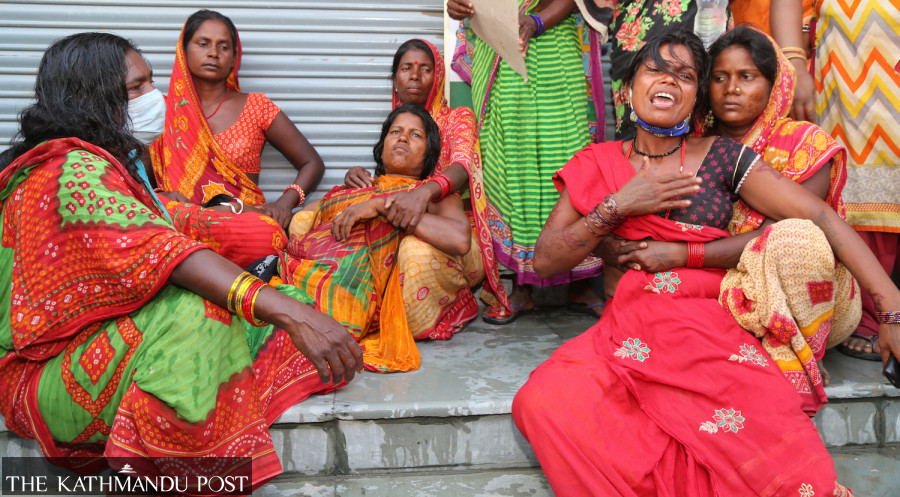National
Dhanusha attorney office says no need to probe Musahar’s custodial death
District attorney’s office claims Musahar committed suicide. Family members say he was tortured to death.
Binod Ghimire
Despite concerns from the United Nations and domestic human rights organisations, the government has refused to investigate the custodial death of Shambhu Sada Musahar.
Musahar, 23, of Sabaila Municipality, Dhanusha, died in judicial custody on June 10, 2020. He was in detention since May 26 that year, after he surrendered before the police after hitting two persons, one of whom died, with a tractor.
Following Musahar's death, his family had tried to file a case with the District Police Office, but it was rejected.
The case was finally registered with the district attorney’s office following pressure from human rights activists and local residents, who had held demonstrations claiming that Sada died as a result of police torture.
For over a year, the attorney's office sat on the case, and two weeks ago, it announced that no investigation was required saying that Musahar's death was a case of suicide.
In January, four United Nations special rapporteurs on human rights had asked the Nepal government for the details of the investigation and action taken against the perpetrators in six cases of custodial deaths between August 2019 and October 2020, including that of Musahar.
The UN special rapporteurs also raised concerns over the government’s reluctance towards investigating such cases.
“It is reported that police routinely refuse to accept complaints and to register First Information Reports (FIRs, the initial complaints to police which formally initiate investigations); and when FIRs are registered, police and prosecutors routinely delay in carrying out investigations, even when issued orders and legal rulings are made by the courts of appeal (high court) and Supreme Court,” stated the correspondence by the UN special rapporteurs.
As a signatory to the Convention Against Torture and Other Cruel, Inhuman or Degrading Treatment or Punishment, Nepal government is obliged to investigate the acts of torture and ill-treatment, identify the perpetrators and bring them to justice.
However, the case of Musahar's death in police custody was never investigated.
Ananta Raj Neupane, the deputy district attorney of Dhanusha, claimed that that the case was investigated and it was concluded that Musahar committed suicide.
“We found it was a case of suicide,” Neupane told the Post. “So we decided that it was not necessary to investigate the accused police officials.”
However, it has been revealed that the district attorney's office, Dhanusha, made the decision to drop the case without consulting the Province-2 Attorney’s Office.
“We had no information regarding the decision,” said Dipendra Jha, chief attorney at the province. “We will check what legal options are available to revive the case.”
Musahar's family has sought the support of the provincial attorney’s office to investigate his death. They say police are reluctant to pursue a case where their colleagues are accused.
In many incidents of custodial deaths, police register cases only after court’s ruling or pressure from rights groups. But once the cases get registered, police rarely investigate them.
Besides Musahar, Bijay Mahara, 19, of Garuda Municipality, Rautahat, had also died on August 27, 2020, after he was allegedly tortured by in police custody. Similarly, Durgesh Yadav, 24, of Aurahi Rural Municipality, Siraha, died in police custody on July 1, 2020, and Rajan Yadav of Ramgopalpur Municipality-7, Mahottari, was shot dead on May 24 last year on drug peddling charges.
In all of the above cases, police were reluctant to investigate the cause of their deaths as demanded by the families of the deceased.
“Musahar's death is just one case in many that demonstrates the difficulties in providing justice to the victims in cases where the state authority is involved,” Bikash Basnet, a programme manager at Advocacy Forum, a rights organisation, told the Post. “There needs to be a separate entity to investigate such cases.”




 13.12°C Kathmandu
13.12°C Kathmandu














